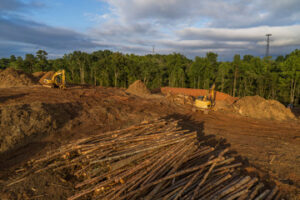Land Clearing involves removing trees, shrubs, and other vegetation to make way for development or farming. It can also include removing rocks, stumps, and other obstacles.

Cleared land can improve safety by reducing trip or fall hazards. It can also help prevent fires by reducing the amount of dry debris. It can also boost property value by making the lot more attractive.
Land clearing is the process of transforming wild or overgrown land into usable space for construction projects, agriculture, or other types of development. It involves removing trees, bushes, and other undergrowth as well as preparing the soil for future use. This is an important step in ensuring that a site is safe for construction and that crops are healthy and protected from pests. It can also help enhance the aesthetics of a property.
While there are many different land clearing methods, the most effective approach combines efficiency with attention to detail and environmental considerations. It starts with a thorough survey of the site, which includes assessing the terrain and noting types of vegetation present as well as any obstacles like large rocks or structures. This information will help determine the best method for clearing the land and what equipment to use.
The most common land clearing method involves using heavy machinery such as bulldozers or excavators to clear away trees, bushes, and other undergrowth. This method is highly efficient and can reduce costs by allowing for larger plots of land to be cleared in less time. However, it is not ideal for fragile ecosystems or areas with steep slopes because it can damage the soil and surrounding plants.
Another popular land clearing method involves using herbicides to kill existing vegetation. While this is a quick and cost-effective option, it can be dangerous for the environment because it can affect non-target vegetation and animals as well as water quality. It is also not suitable for certain types of vegetation, such as deep-rooted weeds or invasive species.
Hand clearing is a more environmentally friendly option that requires the individual to select which plants to remove. While this method is more time-consuming, it allows for a higher level of selectivity compared to other methods that use machines or chemicals.
Once the major obstructions have been removed, the land must be graded, which entails levelling the surface to create an even and stable surface that is appropriate for the desired use. This step can be performed manually or with a machine, depending on the size and complexity of the site. In addition to grading, debris removal and implementation of erosion control measures are often part of the land clearing process.
Site Evaluation
A site evaluation is an essential part of the building process for any land clearing project. It gives the land clearer a better idea of the scope of work involved and how best to get started. This initial assessment also includes identifying any obstacles that might be present. This includes large rocks, structures or other debris that would need to be removed.
A comprehensive site evaluation can help prevent costly mistakes and make the entire construction process run more smoothly. It can also provide insight into the long-term operational needs of your commercial building, allowing you to budget appropriately for any potential maintenance costs.
The first step in the process involves hiring a Septic Qualified Professional (QP). They will conduct a series of tests and analyze the soil conditions. This will help them determine if the property is suitable for an onsite wastewater treatment system, or septic system. These systems are like mini sewage treatment plants that treat domestic sewage/wastewater from dwellings before it can enter groundwater or other limiting layers such as hardpan.
During the site evaluation, QPs will take several factors into consideration, including property dimensions, existing buildings and their uses, water wells and surface water bodies, topographic features and slope, soil conditions, available soil samples, zoning laws, and environmental concerns.
After the site evaluation has been completed, it will be submitted to the County for review. The results are usually available within 30 days. The County may require additional testing and analysis to ensure that the septic system will function properly. This may include a geotechnical survey, test pits, and a visual inspection of the site.
Before starting the construction process, it is important to have a permit for each phase of the build. This will ensure that the building is done safely and to code. The process of obtaining these permits is a bit complicated, but there are steps you can take to prepare ahead of time. These preparations can include viewing your property before the specialist comes out, narrowing down potential building locations, and preparing any other necessary documentation.
Obtaining Permits or Clearances
Land clearing is a meticulous process that can help set the stage for construction and development projects. It involves removing trees, brush, rocks, and debris to create a flat and usable area for a variety of purposes. It is important to choose a company with experience and the proper equipment to ensure the best results. The right provider will be able to efficiently and cost-effectively clear large areas of land for residential, commercial, industrial, and agricultural development.
Many local and state laws govern the removal of vegetation in order to prevent deforestation and loss of habitat for wildlife. It is important to check with your local land planning agency to determine whether you need a clearance or permit before starting any work. Typically, a permit will require you to submit an application and provide details about your project, including location, size of the area, types of vegetation that will be removed, and how the site will be used once cleared.
It is also important to identify any trees or areas that you do not want to be disturbed during the land clearing process. This will ensure that these areas are clearly marked and not cleared away during the process. Clearly communicating this information to your contractor will prevent any damage from occurring and potentially leading to costly legal fees.
Depending on the type of vegetation and terrain, it may be necessary to implement erosion and sediment control measures during the clearing process. Erosion can cause sediment to runoff and contaminate lakes, rivers, and streams, resulting in environmental damage. It is essential to consider these factors when evaluating land clearing companies, as they will need to be familiar with your local soil erosion rules and regulations.
In addition, it is important to find a company that offers ecologically responsible and sustainable services. This includes implementing strategies to minimize erosion, using reusable materials, and employing practices that support biodiversity. By following these tips, you can make the most of your land clearing project and ensure that it is completed in a safe and environmentally responsible manner.
Choosing the Right Equipment
Choosing the right equipment is critical to the land clearing process. The type of machinery needed depends on the project’s size and scope, the terrain, and the types of vegetation present. In general, larger projects require heavy machinery like bulldozers and excavators, while smaller sites can benefit from more lightweight tools. Whether to use hand tools, machines or mulchers, the choice depends on the specific project goals and site conditions.
Conducting a site walk-through is also important to identify obstacles and get an accurate estimate of the job’s cost. It’s vital to determine the terrain, the type of materials and vegetation, and any safety considerations. This information helps contractors choose the best method and equipment for the project, ensuring success from start to finish.
Clearing vegetation helps improve air quality, especially when done correctly. The removal of dead trees and other debris eliminates popular pest hiding spots, reducing the overall population. It can also help reduce the risk of fire by redistributing soil, aerating and improving its condition. Additionally, clearing overgrown areas removes trip and fall hazards and promotes a safer overall space.
Achieving the project’s goals and adhering to regulations are crucial for a successful outcome. Land clearing should align with the long-term objectives of the site, such as preserving or preparing for agriculture or development. Effective waste management and disposal are also critical, including chipping on-site or transporting debris to approved landfills.
The land clearing process can be complex and challenging, but understanding the steps involved can help prevent errors and unforeseen issues. A professional land clearing company is well-versed in laws, regulations, and best practices that ensure the project stays compliant and prioritizes safety at all times. They also have access to specialized equipment designed for the task, which results in more efficient and less disruptive outcomes. Contact a professional clearing company today to see how they can bring your next construction project to life. They can assess your site, determine the best method and equipment for clearing the land, and provide a detailed quote for the work. From there, they can help you move forward with confidence.
